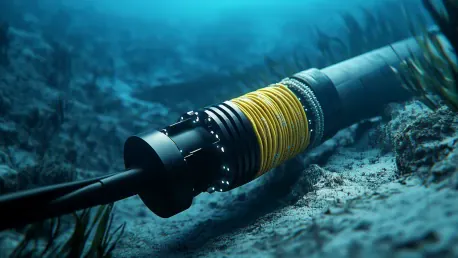Subsea cable damage in the Baltic Sea has raised significant concerns about potential sabotage, highlighting the vulnerabilities in critical infrastructure impacting Sweden, Germany, Lithuania, and Finland. This alarming situation has come to light following two major cuts under suspicious circumstances amid heightened geopolitical tensions in Northern Europe, particularly concerning Russia. Suspicion about Russia’s potential involvement stems from the ongoing regional instability and the history of hybrid warfare tactics targeting vital infrastructure. These incidents are reminiscent of the Nord Stream pipeline explosions of 2022, which incapacitated parts of a key gas pipeline between Europe and Russia, highlighting the potential risks to essential transnational networks.
Recent Disruptions Around the Globe
A Growing Pattern of Suspected Sabotage
This year has seen a troubling pattern of similar disruptions, with incidents not confined to the Baltic Sea but extending globally, questioning whether they are part of a deliberate effort to destabilize critical infrastructure. Notably, the damage to three cables off Yemen in the Red Sea and other disruptions in Western Africa and the South China Sea suggest a possible trend of intentional sabotage rather than mere accidents related to anchor dragging or fishing operations. These critical subsea cables play a pivotal role in modern communication infrastructure, accounting for about 99% of global internet traffic and facilitating financial transactions worth approximately $10 trillion daily. As such, their interference carries enormous implications for international connectivity and the global economy.
Efforts to restore disrupted cables are challenging and protracted, underscoring the need for resilient and quick-response strategies. The delays in repairing the cuts near Yemen, which took over six months to resolve, exemplify the significant logistical and technological hurdles involved, particularly in geopolitically sensitive areas. Such extended downtimes can severely impact businesses and nations reliant on stable and continuous communication channels. Consequently, there is an increasing focus on developing alternative and backup communication solutions, with satellite-based systems gaining attention as a potential supplement to the vulnerable undersea network. These incidents underline the urgent necessity to enhance the security measures around critical subsea infrastructure to safeguard against suspected acts of sabotage.
Imminent Threats to Global Communications
The consolidation of these events indicates an unsettling trend that poses imminent threats to global communications infrastructure, prompting a reevaluation of how we secure these vital assets. Given the central role of subsea cables in both the internet and the financial systems, industry experts and affected governments are sounding alarms about the potential for widespread disruption with severe economic and security ramifications. The Baltic Sea incidents have accelerated efforts to push for enhanced safety protocols and diversified routing options to ensure the resilience of these crucial infrastructures. One troubling aspect is that the current protective measures appear inadequate in deterring sophisticated acts of sabotage, necessitating an overhaul in our approach to safeguarding these networks.
Moreover, these events echo the broader discussions around hybrid warfare, where state and non-state actors might target infrastructure to disrupt or destabilize opponents covertly. The implications are far-reaching, compelling authorities and companies to reconsider existing strategies while exploring more diversified and innovative countermeasures. There is a growing consensus on the strategic importance of subsea cables, emphasizing the urgent need for international cooperation to develop robust frameworks that can effectively counteract and mitigate the risks associated with these vulnerabilities. By ensuring continued connectivity and operational stability, stakeholders aim to protect global communications and economic stability amidst a challenging and unpredictable geopolitical landscape.
Strategic Importance and Necessary Precautions
Industry and Governmental Responses
The relevant industry and governmental bodies are increasingly vocal about the need to safeguard subsea infrastructure to protect the backbone of global communications and financial systems. The response to the Baltic Sea incidents has underscored the strategic urgency of these efforts, with both public and private sectors advocating for expedited safety measures and investment in diversified routing to improve resilience against future disruptions. The consensus among experts highlights that the economic and security implications of these incidents are too significant to ignore, prompting stakeholders to establish more comprehensive and coordinated defensive strategies.
The potential economic impact of prolonged subsea cable disruptions extends far beyond immediate communication breakdowns, affecting everything from international trade to daily financial markets. The intricate nature of undersea cable networks requires advanced monitoring and rapid-response capabilities, a sentiment echoed by industry specialists calling for faster and more reliable backup solutions. The recent trend of increased geopolitical tensions highlights the ongoing risks and necessitates a coordinated global effort to mitigate these vulnerabilities, ensuring that critical infrastructures remain secure and functional despite rising threats of sabotage.
Future Directions and Innovative Solutions
The recent incidents of subsea cable damage in the Baltic Sea have raised major concerns about possible sabotage, underscoring the weaknesses in crucial infrastructure affecting Sweden, Germany, Lithuania, and Finland. This troubling situation has arisen after two significant cuts occurred under suspicious circumstances amidst heightened geopolitical tensions in Northern Europe, particularly involving Russia. The suspicion regarding Russia’s potential involvement is fueled by ongoing regional instability and the country’s known history of employing hybrid warfare tactics targeting essential infrastructure. These events are reminiscent of the Nord Stream pipeline explosions of 2022, which disrupted sections of a vital gas pipeline between Europe and Russia, emphasizing the serious risks to critical transnational networks. The damage to the Baltic Sea cables is a stark reminder of the vulnerabilities and potential threats to Europe’s key infrastructure, necessitating enhanced vigilance and security measures to safeguard these vital links.









